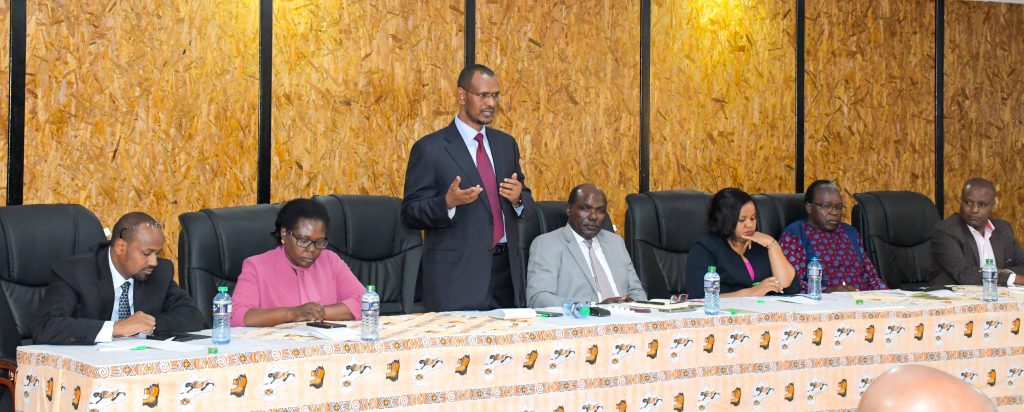Professor Abdi Guliye, the Independent Electoral and Boundaries Commission (IEBC) commissioner, has said IEBC staff braved harassment, abductions, and threats to their life in delivering what he said was a “free and fair” election.
Gully, is one of two commissioners who sided with Chairman Wafula Chebukati when four other commissioners split and accused Chebukati of taking unilateral action and running an opaque operation in the run-up to declaring Deputy President William Ruto winner of the August 9, general election.
In his 18-page affidavit, Guliye, the 4th respondent in the Azimio la Umoja Supreme Court petition, said while the IEBC was still tallying and verifying the presidential election results, some wanted to subvert the will of the people and requested the Commission to help them achieve that goal.
Guliye says that Wafula Chebukati, the Commission’s chairperson told him that on 13th August 2022, Raphael Tuju and Charity Ngilu met him to protest the fast-tracking of the verification process of the results.
“It is unclear why a faster conclusion of the process seemed to bother them,” Guliye’s testimony reads.
Further, the Commissioner alleges that Tuju, Amos Wako, and Kyalo Mbobu visited Chebukati on 15th August 2022, at 3 am.
He says Chebukati called all 7 commissioners to join him to engage the visitors. In the meeting, Wako questioned why IEBC was operating in a vacuum. Wako stated that the Commission must consider the link between the election results to be declared and the stability, Guliye alleged further.
“Wako proceeded to indicate that in his term as Attorney General, he also served as the election supervisor, and in that capacity, he would moderate results guided by the need to achieve law and stability in the country,” the affidavit reads.
Guliye states further that Tuju wanted the results to be moderated in favor of Odinga and that any contrary declaration of results would plunge the country into chaos.
He said Tuju suggested that if it were impossible to declare Odinga as the president-elect, the Commission should force a run-off and promised a handsome reward if they granted his wish.
The Commissioner said they all turned down Tuju’s request because Chebukati had made up his mind to respect the people’s will and announce the results per the final tally from all the polling stations.
Later the same morning, the Deputy Inspector General of Police, Noor Gabow, went to the IEBC holding room and informed Guliye that a National Security Advisory Committee (NSAC) team had arrived at Bomas and wanted to meet the chairperson.
Chebukati was busy with his duties and indicated that he would convene a briefing meeting with the commissioners at 2 pm regarding the final results and to listen to the visiting team.
Shortly after 2 pm, the meeting with the NSAC delegation commenced. Guliye says that the delegation was led by Kennedy Kihara, the Principal Administrative Secretary at the Office of the President. The other participants were Kennedy Ogeto (Solicitor General), Hillary Mutyambai (Inspector General of Police), and Lieutenant General Francis Omondi Ogolla (Vice Chief of Defence Forces).
Further, he states that Kihara said that if the Commission declared William Ruto as the President-Elect, the country would burn due to skirmishes between Luo and Kikuyu communities.
Guliye, in his affidavit, said the NSAC delegation insisted that if IEBC could not announce Raila Odinga as the outright winner, it had to ensure a run-off.
“Wako proceeded to indicate that in his term as Attorney General, he also served as the election supervisor, and in that capacity, he would moderate results guided by the need to achieve law and stability in the country” — IEBC Commissioner Prof. Abdi Guliye.
After the meeting, Commissioners Justus Nyang’aya, Irene Masit, Francis Wanderi, and Vice Chairperson Juliana Cherera said that the message from the NSAC warranted serious consideration before deciding on the results, Guliye said.
However, the chairperson said IEBC had an oath of office that required fidelity to the Constitution. The NSAC delegation left shortly after, at about 3 pm, the affidavit reads.
After the NSAC team had left, IEBC CEO Marjan Hussein Marjan walked into the boardroom with the final results and handed over a copy of the results to each Commissioner. A debate ensued. Four Commissioners, Cherera, Nyang’aya, Irene Masit, and Wanderi, protested and insisted that the results should be changed in the light of the NSAC delegation’s communication, Guliye said.
“Cherera suggested that the margin is not too big and could be manipulated by moving 233,211 votes from Ruto to the rejected ballots category,” Guliye said in his affidavit.
After listening to all the commissioners’ views, Chebukati said that he would not discuss subversion of the will of the people and that he would announce and declare the final results per the verified tallies.
Guliye was to announce the results of the remaining 27 constituencies before the chairman could make the final declaration. However, he said, the results were verified in the presence of party agents and included in the final tally in Form 34C.
His statement seems to confirm allegations from the four objecting commissioners that Chebukati did not seek the input of all commissioners before announcing Deputy President William Ruto as the winner of the vote.
Before he could read the results from the remaining constituencies, some fracas ensued, making it difficult for him to announce the results of the remaining 27 constituencies.
When they restored peace, the chairman declared the final results amid chaos and could not go through all the county summations.
Guliye calls for the arrest of the aggressors at Bomas, who he said injured him.
